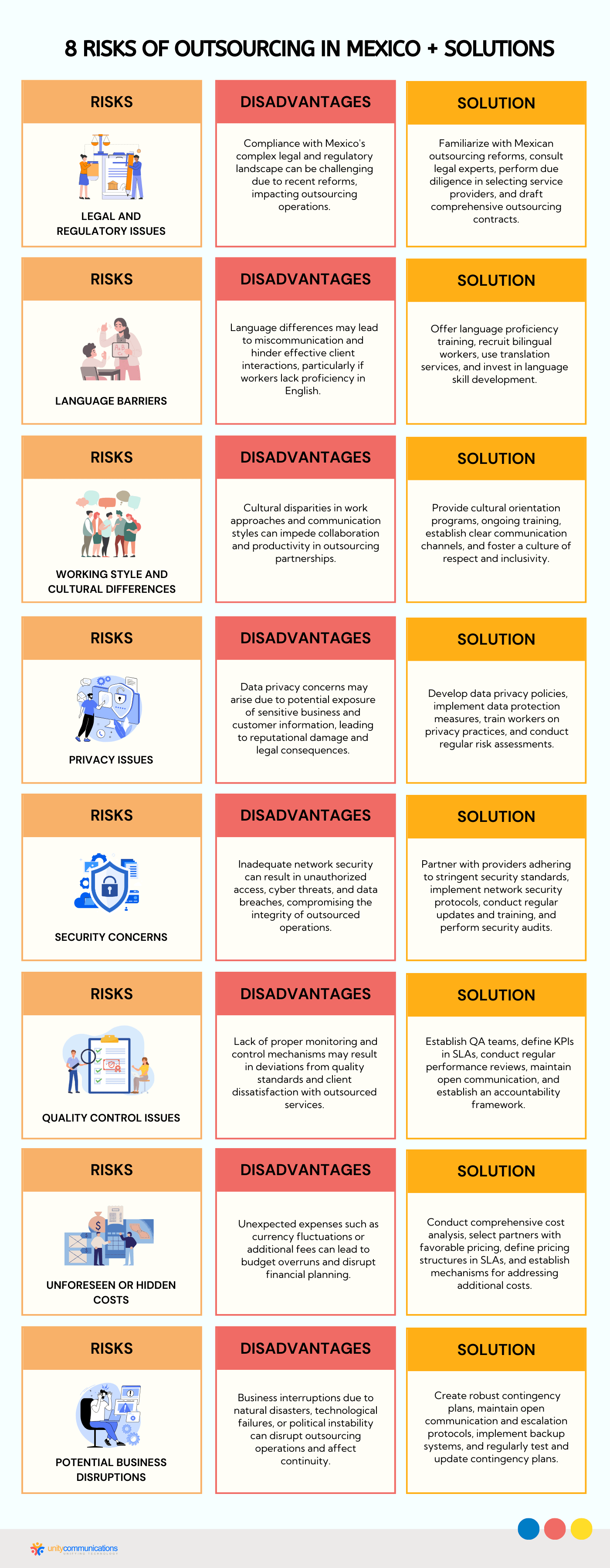Table of Contents
Nearshore outsourcing has become a practical business solution for streamlining operations and reducing costs. As such, Mexico is a leading destination for North American businesses looking to outsource.
The country offers cost-effective labor, rising technology hubs, favorable trade agreements, and geographical proximity. Working with customer support specialists, technical support representatives, and virtual assistants in Mexico is the best way to leverage physical proximity to the service provider.
But did you know that Mexican outsourcing comes with potential challenges and risks?
This comprehensive guide explores the pros and cons of outsourcing to Mexico. Read on to learn practical solutions for addressing these disadvantages.
Why Mexico Is a Popular Outsourcing Destination

Mexico has emerged as one of the top outsourcing hubs worldwide. The country is notable for its cheaper labor, skilled workforce, growing technology zones, and favorable trade treaties. These benefits mostly outweigh the cons of outsourcing to Mexico. However, businesses should consider the strategy’s advantages and disadvantages before taking the plunge.
Mexico is popular for nearshore outsourcing because of its geographical advantage and compatible time zones. Companies in the United States and other North American countries find working with Mexican service providers easier.
The Mexican outsourcing industry started with the rise of Maquiladora, which later led to the establishment of the Border Industrialization Program for manufacturing operations in the country. Today, Mexico is known for its information technology outsourcing (ITO) and business process outsourcing (BPO) services.
Mexico’s ITO market might grow from $4.42 billion in 2023 to $7.90 billion by 2028 at a compound annual growth rate (CAGR) of 12.30%. The country is known for its software development and IT support services.
Meanwhile, what is business process outsourcing? BPO is the practice of outsourcing tasks to third-party service providers. Its market in Mexico is poised to experience substantial growth and expansion, projected to grow from $3.87 billion in 2023 to $4.90 billion by 2028 at a 4.86% CAGR.
Benefits of Outsourcing to Mexico
What makes Mexico one of the leading outsourcing destinations? Here are some of the reasons:
- Undivided focus on core activities. The Mexican government amended the Federal Labor Law (FLL), only allowing companies to subcontract non-core operations. Outsourcing to Mexico frees up your time and lets you focus on your core objectives—making money and growing your business.
- Significant savings on labor costs. Outsource Accelerator cites that the average wage in Mexico is $7.03 per workday. Outsourcing to the country allows you to cut labor expenses and operating costs, such as office leases, utilities, and supplies.
- Vast pool of skilled talent. The Mexican government invests in people through science, technology, engineering, and mathematics (STEM) education. For instance, the country produces over 130,000 engineering graduates annually, contributing to the ITO workforce.
- High staff retention rate. Unlike other outsourcing destinations, employee turnover is not one of the cons of outsourcing to Mexico. The country has impressive retention rates due to less competition in the market, not to mention its reasonable compensation and career opportunities.
- Digital ecozones and tech hubs. Mexico has developed digital ecozones and tech hubs, such as Guadalajara’s “Silicon Valley” and Monterrey’s “Digital Creative City.” As such, the country is ideal for IT and technical support outsourcing services.
- Ideal trade agreements. Mexico has 13 Free Trade Agreements (FTAs) with 50 countries, making it the best for outsourcing. These treaties include the North American Free Trade Agreement (NAFTA), the United States-Mexico-Canada Agreement (USMCA), and the Japan-Mexico Free Trade Agreement.
- Geographical proximity and identical time zones. Mexico is located in the southern part of North America, sharing borders with the United States to the north. The country benefits North American businesses because of its geography and time zones, ensuring seamless communication and collaboration.
- Flexible and scalable business. Outsourcing to Mexico offers flexible contracts, allowing businesses to scale their operations during peak or off-seasons. Such flexibility lets you adapt to market changes and seize growth opportunities.
- Improved efficiency, quality, and customer satisfaction (CSAT). Outsourcing to Mexico gives you access to expertise, technology, and resources. These factors can help improve your processes, translating to enhanced efficiency, service quality, and CSAT.
- Enhanced profits and growth. Companies must be wary of the cons of outsourcing to Mexico, but that does not mean they cannot capitalize on its advantages. With their cost-saving benefits, skilled talent, and operational efficiency, Mexican service providers can boost your profits and achieve sustainable growth.
Eight Disadvantages of Outsourcing to Mexico

Weighing the pros and cons of outsourcing to Mexico is vital. But you can still mitigate some of its risks and challenges, whether you employ front-office or back-office outsourcing.
Below are the eight disadvantages of Mexican outsourcing you must know and the practical solutions for addressing them.
1. Legal and Regulatory Issues: Understand and Ensure 100% Compliance
Businesses looking to outsource must understand and comply with the laws and regulations of the service provider’s country. However, Mexico is a particularly unique case. Its legal and regulatory requirements can challenge companies seeking to outsource to the country.
The Mexican government enacted the FLL reform in April 2021, prohibiting outsourcing workers for businesses’ core activities. Companies can only subcontract specialized services considered non-core to business operations, such as call or contact centers, sales and marketing, and administrative functions.
Solutions:
|
2. Language Barriers: Offer Language Proficiency Training
Language differences and poor communication can be among the cons of outsourcing to Mexico. Mexicans speak Spanish and might not speak English fluently while catering to North American clients. Miscommunication can lead to potential misunderstandings, service errors, and work delays.
However, some Mexicans are bilingual and can fluently speak Spanish and English. You can tap them for your contact center operations to serve your Spanish customers. Just be sure to invest in language proficiency training to minimize language barriers.
Solutions:
|
3. Working Style and Cultural Differences: Provide Cultural Orientation
Outsourcing involves a partnership between two businesses, often operating in different countries. Companies might encounter different cultural norms and business practices. These factors can pose disadvantages when outsourcing to Mexico.
Different work approaches, decision-making processes, and communication styles can lead to communication and collaboration issues. If not adequately addressed, these differences can impact teamwork, productivity, and the overall effectiveness of outsourcing engagements.
Solutions:
|
4. Privacy Issues: Set Data Privacy Policies
Did you know nearly 125 million datasets were exposed during the fourth quarter of 2020? Statista states that this is the highest record of data breaches ever recorded. Businesses today, including BPO firms, are thus prioritizing cybersecurity.
Unfortunately, the data privacy issue is one of the cons of outsourcing to Mexico. Whether outsourcing customer support or data entry services, Mexican service providers might expose your business and customer information to physical and cyber attackers. This risk can lead to data breaches, reputational damages, and legal consequences.
Solutions:
|
5. Security Concerns: Establish Network Security Protocols
Data privacy and network security go hand in hand. A lack of robust security, especially online, can lead to data breaches. 2023 is estimated to have approximately 800,000 cyberattacks, and the number is rising annually. Thus, securing your network is necessary to safeguard your data.
Security concerns can be a disadvantage in Mexican outsourcing. Inadequate technologies and policies can result in unauthorized access, cyber threats, and data breaches. Poor networks can also lead to data errors and work delays in your outsourcing engagement.
Solutions:
|
6. Quality Control Issues: Require Regular Performance Monitoring
Quality control issues are among the cons of outsourcing to Mexico. Generally, businesses that venture into ITO and BPO partnerships inevitably encounter quality assurance (QA) concerns. This problem is especially true for nearshore and offshore outsourcing.
The lack of proper monitoring and control mechanisms can negatively impact your business when outsourcing to Mexico. Deviations from key performance indicators (KPIs) and SLAs can translate to subpar deliverables and client dissatisfaction. Therefore, establishing effective quality control processes is imperative.
Solutions:
|
7. Unforeseen or Hidden Costs: Include Pricing Structure in the Contract
Cost reduction is the top outsourcing reason for most businesses. Working with foreign service providers saves companies money on labor and operating costs. However, they might also encounter unexpected expenses.
Mexican outsourcing might catch you off guard with financial expenses. Unexpected costs, such as currency fluctuations, additional fees, or unforeseen circumstances, can lead to budget overruns and disrupt your financial planning. They defeat the purpose of outsourcing to save money in the long term.
Solutions:
|
8. Potential Business Disruptions: Set Contingency Plans in Place
Nearshore outsourcing involves two companies operating in different countries. However, can you guarantee continuous business operations in a different location? The answer to this question is what every business must consider when outsourcing.
Unfortunately, business disruption is one of the cons of outsourcing to Mexico. Natural calamities, technological failures, and political instability can cause business interruptions and work delays. When outsourcing, you must come prepared and ready for such disruptions.
Solutions:
|
The Bottom Line

Mexico is one of the leading destinations for nearshore outsourcing. It has several potential benefits, from significant savings on labor costs to better profits.
Companies should prepare for possible challenges and risks as they explore Mexican outsourcing. Remember the cons of outsourcing to Mexico discussed above, from legal and regulatory issues to potential business disruptions. Carefully considering these possible drawbacks is crucial.
By understanding these disadvantages and taking proactive measures to address them, you can make informed outsourcing decisions for business growth and success.
Ready to outsource your non-core functions or tasks to Mexico? You have come to the right place. Unity Communications can help you address the drawbacks of Mexican outsourcing and reap its benefits. Let’s connect today to get started with outsourcing!




